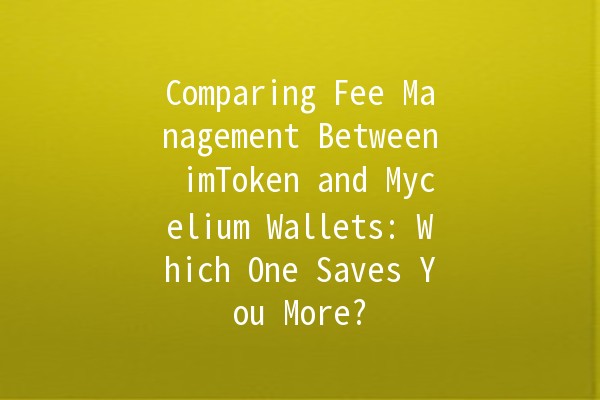Cryptocurrencies have opened up new frontiers in finance, allowing individuals greater control over their assets. With the rise of digital wallets, users are often faced with the challenging task of deciding which wallet to choose. imToken and Mycelium are two popular options, each having its own advantages and unique fee structures. In this article, we will delve into a detailed comparison of fee management between imToken and Mycelium, providing you with valuable insights to make an informed decision.
Before we start comparing imToken and Mycelium, it is crucial to understand the types of fees that digital wallets typically charge. These fees can significantly affect your overall experience and investment returns.

With this understanding of wallet fees, let’s move forward to specifically compare imToken and Mycelium.
imToken is a multichain wallet that allows users to store and manage various cryptocurrencies. It is widely recognized for its userfriendly interface and advanced security features. Founded in 2016, imToken has gained popularity, especially among Chinese users.
Mycelium, on the other hand, has been around since 2013 and is renowned for its robust privacy features and innovative tools for Bitcoin management. It is particularly favored by Bitcoin enthusiasts for its advanced functionalities and security protocols.
imToken Transaction Fees:
imToken does not have a fixed transaction fee; instead, it calculates fees based on network conditions. Users can adjust the fee amount, allowing for quick confirmations if they opt for higher fees but potentially longer wait times with lower fees.
This adaptability can be beneficial during periods of network congestion, ensuring transactions are processed in a timely manner.
Mycelium Transaction Fees:
Mycelium also employs a dynamic fee system based on the current network demand. Users can customize their fees as well, aligning costs to immediate needs.
One standout feature of Mycelium is that it allows users to preview the estimated fee for their transaction, leading to better decisionmaking.
*: Both wallets provide flexible options for transaction fees, allowing users to tailor their payment according to urgency. However, Mycelium's preview feature can offer an edge to those new to cryptocurrencies.
imToken Withdrawal Fees:
imToken allows free withdrawals for certain cryptocurrencies; however, fees may apply for others, varying by asset and network. Users are encouraged to check specific withdrawal fees beforehand.
Mycelium Withdrawal Fees:
Mycelium charges a flat fee for Bitcoin withdrawals. The fee structure can be more straightforward, which may appeal to users who prefer transparency regarding costs.
: imToken could offer more flexibility, while Mycelium’s flat fee structure may be attractive for straightforward Bitcoin transactions.
imToken Conversion Fees:
imToken provides an integrated token swap feature that allows users to exchange cryptocurrencies seamlessly. It's worth noting that conversion rates can include hidden fees, so careful consideration of exchange rates is necessary.
Mycelium Conversion Fees:
Mycelium also allows trading between Bitcoin and Ethereum, but it typically employs thirdparty services for swaps, which can lead to varying conversion fees.
: imToken has a more integrated approach, but users should be aware of the potential for hidden fees. Conversely, Mycelium requires attention to thirdparty fees.
imToken Inactivity Fees:
As of the latest update, imToken does not charge fees for account inactivity, making it a userfriendly choice for those who do not trade constantly.
Mycelium Inactivity Fees:
Mycelium similarly does not impose inactivity fees, focused instead on ensuring that all user assets remain accessible without penalties.
: Both wallets offer a nonpunitive approach regarding inactivity, which is a significant benefit for longterm holders.
imToken Deposit Fees:
Typically, no deposit fees are charged for funding your imToken wallet. However, always check specific networks' policies to confirm.
Mycelium Deposit Fees:
Mycelium also does not charge fees for deposits, enhancing its reputation as a costefficient option.
: Both wallets excel here, as neither imposes deposit fees.
To maximize your cryptocurrency management with imToken and Mycelium, consider implementing the following five productivityenhancing techniques:
Application: Familiarize yourself with each wallet's fee setting features. Adjust fees according to urgency, and utilize realtime information to make costeffective choices.
Application: Keep an eye on network congestion levels. Utilize thirdparty block explorers to assess congestion and determine the best time for transactions to minimize fees.
Application: Stay updated with the wallet you choose to ensure you aren’t missing out on any fee adjustments or promotions that could save you money.
Application: Dive deep into features like swapping cryptocurrencies in imToken or privacy tools in Mycelium. These features can enhance your trading efficiency and overall experience.
Application: Turn on notifications within both wallets to stay updated on transactions and significant changes in fees. This keeps you informed and prepared to manage your funds effectively.
The primary difference lies in the adaptability of transaction fees. ImToken allows for dynamic fee adjustments per transaction, while Mycelium provides clear, flat fees for certain withdrawals, particularly with Bitcoin.
Both wallets claim to maintain transparency; however, imToken’s integrated conversion feature might produce indirect fees through less favorable exchange rates. Always review terms for clarity.
Both wallets do not charge inactivity fees, making them suitable for longterm storage. Your choice should depend more on usability and security preferences.
ImToken offers a seamless portfolio management experience with multichain capabilities, while Mycelium focuses on privacy and advanced Bitcoin management.
Yes, both wallets support a variety of cryptocurrencies, although imToken has a broader range due to its multichain capability.
Both wallets offer various support channels, including FAQ sections and user communities. User reviews may vary; thus, exploring experiences beforehand can be beneficial.
Having explored the fee structures and management features of imToken and Mycelium wallets, it’s evident that both have unique propositions catering to different user needs. The choice ultimately lies in understanding which wallet aligns better with your financial strategy and personal preferences. By leveraging their features wisely and staying informed about fees, you can optimize your cryptocurrency management.
Choose wisely and happy transacting!